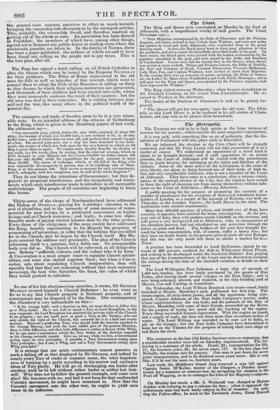In one of his late electioneering speeches, it seems, Sir
GEORGE MURRAY avowed himself a Church Reformer : he even went so far as to say that Church property is National property, and of consequence may be disposed of by the State. Our contemporary the Standard is very melancholic on this- " If Sir George holds such a doctrine as this, we must decline to follow him as a Tory leader. He is not half so much a Tory as Lord Brougham, in the case supposed—for Lord Brougham has admitted the private right of the Church to its property ; nor one tenth part as good a Tory as Mr. Stanley, who not only admits the right of the Church, but contends for it in a bold and manly manner. Between a professing Tory, who should hold the doctrine ascribed to Sir George Murray, and even the most infidel part of the present Ministry, there is little difference, and that little difference is rather in favour of the Whig, for he can assert a consistency which the Tory holder of the doctrine imputed to Sir George certainly cannot. Give us, we say, while we live, a Government acting upon its own principles : if possible, a Tory Government acting upon Tory principles ; but if not, a Whig, and not a Tory Government acting upon Whig principles."
It is strange that our acute contemporary cannot perceive in such a falling off as that displayed by Sir GEORGE, and indeed by nearly every Tory of credit or common sense, the utter hopeless- ness of keeping up a party according to his narrow and exclusive ideas of Tory purity. He will go on discharging one leader after another, until he be left without either leader or soldier but him- self. Why does not he follow the general example, and come over also? He was once with us; and had it not been for that confounded Country movement, he might have remained so. Now that the Country movement sets the other way, he ought to yield once more to its influence.



























 Previous page
Previous page